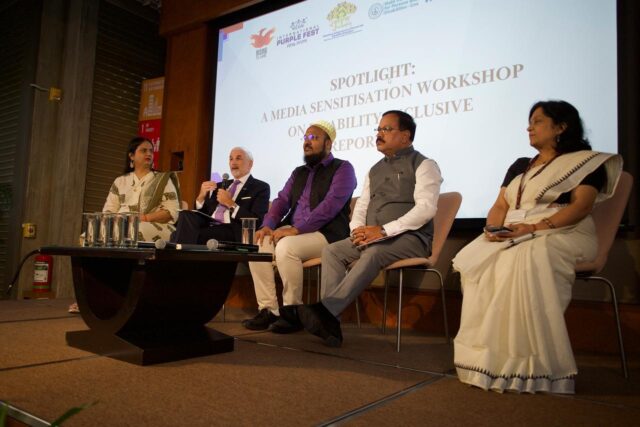Rising Flame, in collaboration with the Department of Empowerment of Persons with Disabilities (Government of India), the Office of the State Commissioner for Persons with Disabilities, Goa, the UN in India, and UN Women, organised Spotlight, held a media sensitisation workshop on inclusive and intersectional reporting on disability on Monday, 22 September 2025. The workshop brought together 50 journalists, editors, media and communication professionals to focus on disability representations in newsrooms and narratives across the country.
Through a learning section, Disability-inclusive and Intersectional Media Representation and Reporting led by Rising Flame, the workshop explored how language and framing of stories impacts attitudes of larger society. The interactive session opened up conversation around framing stories to portray the diverse experiences of persons with disabilities and to build a culture of accurate and respectful reporting.
Founder and executive director of Rising Flame, Nidhi Goyal who co-facilitated the session said: “Too often, the media paints us people with disabilities as either heroes or objects of pity. We need to go beyond both. There is a need to amplify disabled voices and building nuanced, human-centred stories. Since media plays a critical role in shaping public understanding and influencing policy, journalists can ensure disability is covered with accuracy, dignity, and a rights-based lens.”
In the second session Senior Journalists Share Experiences on Reporting Gender and Disability led by UN Women, with the panel moderator, Sudeshna Mukherjee, Head of Communications, UN Women India with some experienced journalists and communication professionals as panellists: Uzmi Athar, Chief Correspondent, PTI, Parvinder Singh, Head of Communications, World Food Programme in India, Pooja Pande, former Co-Chief Executive Officer, Chambal Media, writer and Bhanupriya Rao, Founder of BehanBox.
Panellists addressed some important facets of reporting on disability. Such as, disability is not just a beat and there is a need to focus on it as central and important like we do for other things like health etc.
One example cited by panellist, Uzmi Athar was: “When we speak about natural disasters, we need to include how persons with disabilities are impacted by this. When we frame a story that someone braved to reach a polling booth. We should be asking the question of why he had to brave the “difficulties” to vote.”
In many ways, the experienced journalists and communication professionals is that “Communication is a strong medium for pushing social inclusion.” Panellists also spoke of the need to address how disability intersects with governance, with policy, with healthcare, with infrastructure, with COVID.
Pooja Pande, former Co-Chief Executive Officer, Chambal Media writer spoke about the need to move away from the binaries of narratives. She said, “These binaries of, inspiring, feel-good narratives, or this pity narratives. Let it be about humanity, so even if we’re talking about inspiring stories, we need to ask the questions, like focus on disabled entrepreneurs just like I would cover a woman entrepreneur on the ground.”
The final session for the day was the press interaction with
Shombi Sharp, UN Resident Coordinator, India, Shri Taha Haaziq, Secretary, Office of the State Commissioner for Persons with Disabilities, Goa, Richa Shanker, Deputy Director General, Department of Empowerment of Persons with Disabilities, Ministry of Social Justice and Empowerment Government of India, Subhash Phal Desai, Minister of Social Welfare, State Government of Goa.
Shombi Sharp shared the immense power of media to shape perceptions and drive social change. He said, “As we look forward to the International Purple Fest, Goa this moment is an opportunity to help ensure that stories about persons with disabilities appropriately reflect rights, dignity and inclusion. The United Nations is proud to stand with partners in reimagining journalism that leaves no one behind and furthers India’s inclusion leadership journey.”
Sharp also emphasised that there is a need to shift mindsets and narratives from charity to rights-based, from silence to active voice, from the margins to actually core, mainstream social and economic development in every way.
Phal Dessai spoke about the objective behind organising the Purple Fest is to promote inclusivity, accessibility, and empowerment for persons with disabilities. He closed by saying: “The International Purple Fest, Goa is more than an event – it’s a movement to bring visibility, dignity, and pride to the lives of persons with disabilities. We urge the media to join this global movement led by Government of Goa in the form of International Purple Fest and embrace diversity and inclusion.”
Taha Haaziq, Secretary, Office of the State Commissioner for Persons with Disabilities, Goa spoke about the variety of ways in which Purple Fest is organised across the four days. Such as Purple Think Tank, Purple Conventions, Purple experience zones. He said: “We strongly believe at International Purple Fest Goa, that there’s a very fun side of any human being. And why should a person with disability be left behind or out of this fun? That is why the Purple Fest also explores our creativity, our talents and so on.”






